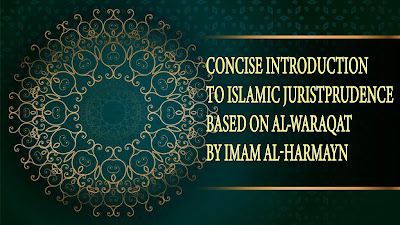Al-Waraqat, by Imam al-Harmayn ,Abdul-Malik bin Abdul-Allah al-Juwayni
Definition of al-Hukum ash-Shar’i (a shariah rule)
It is an address issued by the lawgiver, Allah, concerning the conduct of mukallafin (persons in full possession of their faculties). It consists of demand, option, or enactment.
There are two types of Shariah rules.
a) Ahkam taklifiyah: They refer to something that the Shariah address demands doing something, refraining from doing something, or giving the option to do or not do something. These rules are as follows: 1) the obligatory, 2) the recommended, 3) the permissible, 4) the unlawful, and 5) the disliked.
b) Ahkam wad’iyah: They refer to something that the Shariah address indicates causes, conditions, and hindrances. These rules are recognized when there is a Shariah rule demanding doing or refraining from doing something. Consequently, it is determined validity of doing something or invalidity of doing something.
For example, owning of nisab (the minimum amount of a Muslim net worth to be obligated to pay zakat) is a cause for giving zakat, making ablution is a condition for praying, and menstruation is a hindrance preventing women from performing the prayer.
Ahkam Taklififyah
1) The obligatory (al-wajib): It is an act that one will be rewarded for doing it, and punished for not doing it.
For example, praying the five obligatory prayers is obligatory. Thus, one who prays them will be rewarded and he will be punished if he refrains from performing them.
2) The recommended (al-Manduwb): It is an act that one will be rewarded for doing it, and not punished for not doing it.
For example, it is recommended to use miswak (teeth cleaning twig). A person who uses it will be rewarded and if he does not use it, he will not be punished.
3) The permissible (al-Mubah): It is an act that one will not be rewarded for doing it, and not punished for doing it.
For example, taking a bath on a hot day for refreshment.
4) The unlawful (al-Mahzur): It is an act that one who does not do it will be rewarded and punished if he does it.
For example, backbiting. One will be rewarded if he refrains from backbiting, and punished for doing it.
5) The disliked (al-Makruh): It is an act that one will be rewarded for not doing it and not punished for doing.
For example, praying a voluntary prayer after praying Asr prayer and until sunset is disliked.

No comments:
Post a Comment